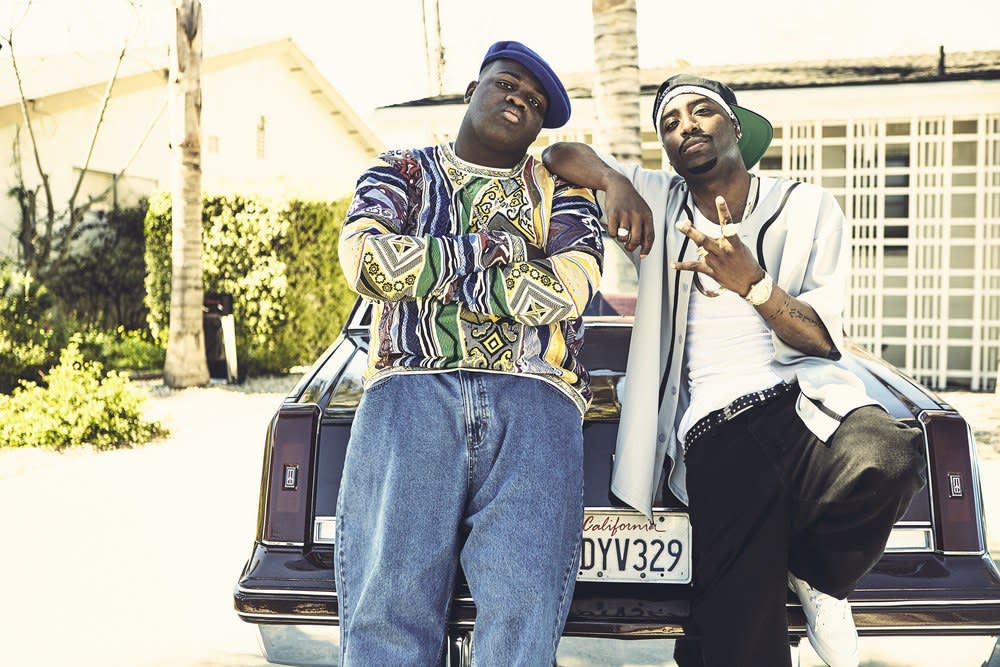Unsolved: The Murders of Tupac & the Notorious B.I.G. Review: An Ambitious, Messy Spin on a True Crime

You’ll probably go into Unsolved: The Murders of Tupac & the Notorious B.I.G., the new USA crime drama that premieres this week, expecting to learn about the murders of Tupac and Biggie Smalls. It’s right there in the title. And the series certainly doesn’t shy away from exploring the many, many theories about Tupac and Biggie’s deaths. (As one cop says, somewhat incredulously, to another: "This is a federal task force, with all the bells and whistles that go along with it, to solve the murder of a young black man. Maybe two.")
But for better or worse, Unsolved doesn’t stop there. The series also uses the two famous victims at the heart of its story as an entry point to explore the broader and darker history of the LAPD, from its well-documented history of racism to the Rampart corruption scandal, which had tendrils that extended well beyond the possibility of a connection to Biggie’s murder.
There’s a lot of ground to cover, and Unsolved sometimes struggles to cram it all in, marring the multi-timeline structure of True Detective with the juicy true-crime angle of American Crime Story. If anything, Unsolved is a little too busy, hopping between Tupac and Biggie-centric stories in the early ‘90s, the subsequent investigation into Biggie’s death by the LAPD in 1997, and a second LAPD investigation—spurred on by a lawsuit from Biggie’s mother—in 2006.
Director Anthony Hemingway—who helmed half of FX’s American Crime Story: The People vs. O.J. Simpson, and helms half of Unsolved, including its first two episodes—does an admirable job making each of the three timelines visually distinct. Tupac and Biggie scenes are presented in tinted yellow, which evokes nostalgia for a golden age of hip-hop that was cut short by the East Coast-West Coast rivalry.
The Biggie-Tupac material will be the most familiar to most viewers, if only because each man’s story has been chronicled so exhaustively over the years (including two big-screen biopics—Notorious and All Eyez On Me—within the past decade alone). Even with 10 hours to tell the stories of these two young artists’ relatively short lives, Unsolved falls into a few standard biopic traps, from peppering too many scenes with cutesy in-jokes to speeding through a highlight reel of life events. (The decision to do the lightest of glosses on Tupac’s 1995 conviction for first-degree sexual abuse, for which he eventually served nine months in prison, is particularly appalling.) But even in its weakest flashbacks, Unsolved finds a pair of capable stars in Wavyy Jonez, who plays Biggie, and Marcc Rose, who reprises the role of Tupac after making his debut in 2015’s Straight Outta Compton.
More revelatory is the perspective of squeaky-clean LAPD detective Russell Poole (Jimmi Simpson), whose obsession with connecting the murders of Tupac and Biggie leads him down a conspiratorial rabbit-hole that put him at odds with the LAPD itself. It’s a character type you’ve seen in a thousand cop dramas, but Simpson is always a welcome, intelligent presence, and he gives Poole’s increasingly fraught and lonely position the appropriate texture and weight.
The 2006 timeline is both the least interesting and the most difficult to follow. As Greg Kading, the detective in charge of the Biggie Smalls task force—and the real-life figure who wrote the book on which Unsolved is based—Josh Duhamel is fuzzier and less compelling than any of the investigators he assembles. Fortunately, his task force includes roles for heavyweight actors like Bokeem Woodbine and Wendell Pierce—neither a stranger to twisty crime dramas—with Woodbine, in particular, excelling as a savvy cop with a private motivation of his own. (Pierce, unfortunately, is saddled with most of the show’s clunkiest dialogue—including, "You may not like the way I do things, but I get the job done," a cliche so ancient and creaky you could probably find it on the walls of Lascaux.)
On top of it all, Unsolved has one potentially fatal problem: The complete lack of any music from Tupac or Biggie. The show does its best to work around the absence of licensed tracks with judicious use of backing tracks—and occasional, not-bad freestyling from Wavyy Jones and Marcc Rose—but it’s always going to be glaring when the show with "Tupac and The Notorious B.I.G." in the title features music from neither Tupac nor The Notorious B.I.G.
But in the end, Unsolved doesn’t claim to be about Tupac and Biggie; it claims to be about their murders, and it serves up a full slate of names and theories to contemplate in connection with the still-unpunished crimes. Like any decent true-crime show, watching Unsolved will probably send you into a Wikipedia wormhole as you pause to look up the many half-forgotten, real-life incidents that pop up along the way. And if the show doesn’t provide all the answers you’ll want, it at least manages to provide a solid baseline for asking the questions.

